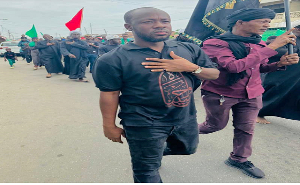 A procession of Shia Muslim Youth, Ghana honouring the Day of Arba`een in Accra
A procession of Shia Muslim Youth, Ghana honouring the Day of Arba`een in Accra
Arba’een marks the 40th anniversary of the martyrdom of Imam Hussain Ibn Ali as the grandson of the Holy Prophet Muhammad (saww), during which Shia Muslims commemorate by visiting the tomb or organizing peaceful processions in a show of love and solidarity for the beloved grandson of the Holy Prophet Muhammad (saww).
Both the pilgrimage to the tomb and commemoration by way of trek have been attributed to the journeys of love, reason, peace, unity, and solidarity.
Arba`een has therefore become the largest annual peaceful gathering in the world.
The Chairman of the Shia Muslim Youth, Alhajj Abdul Aziz Haruna, reiterated in his address to the media that “as far as the Shia Muslims are concerned, honouring Imam Hussain (as) on Arba’een isn't just about commemorating his martyrdom, but to pledge and renew our allegiance to Hussain and the individual and societal values he stood for, like reason, the rule of law, good governance, justice, equilibrium, human rights, and freedom, and to seek to personify those principles in ourselves.”
Let us replicate this gesture of humanity nationally:
As Ghana heads towards election 2024, the leadership of the Shia Muslim Youth appeals to the Ghanaian electorate to practice and spread the message of justice, civil responsibility, peace, and compassion through their day-to-day conduct.
There is also the need to relay the message of human edification, reformation, and cultivation exhibited by Imam Husain (as) to enlighten the electorate, especially the youth in the farthest corners of the country and beyond.
The conduct of presidential and parliamentary elections has always played a salient role in Ghana`s collective political aspirations and prosperity.
Multiparty elections have over the years conferred legitimacy on public office holders and regimes in Ghana and the subregion, and they are considered today the most widely accepted international source of legitimacy to rule. So, the conduct of free, fair, peaceful and transparent electoral process in 2024
presidential bout is an important necessity.
It is no longer news that on December 7, 2024, Ghanaians will be going to the polls to elect legislators and the chief executive of the nation. Ghana has done it peacefully before and needs to replicate such a national political success devoid of violence. The perpetrators of political and electoral violence are not necessarily politicians but the youth.
We, the Muslim youth in the country, must take it upon ourselves to educate each other about conflict management and peacebuilding, elections as a civil responsibility, and the social menace known as electoral violence.
If we do not take into account, edify, cultivate, and enlighten ourselves about the need to embrace non-violence and pacifism and appreciate the spirit of togetherness and the peaceful coexistence we have been enjoying from time immemorial, we may have ourselves to blame.
The Holy Qur`an states: “Allah does not change the conditions of a people until they change what is in themselves. Quran 13:11."
It appears that the election in 2024 is extraordinary and risks being contentious. However, we, the youth, can therefore be important players in the search for peace, as we may see opportunities for resolving conflicts that are beyond the imagination of conflict experts. We must ensure that the election in 2024 is free, fair, transparent, and peaceful. We urge all the stakeholders to also strive to champion the course of peace before, during, and after the 2024 election.
We, the Shia Muslim Youth in the country, have by far recognized this situation and strongly opposed electoral violence. We therefore call on civil society organizations to help facilitate sessions for the youth on elections and democracy in order that they can be well informed about the conduct of elections as a civic responsibility."